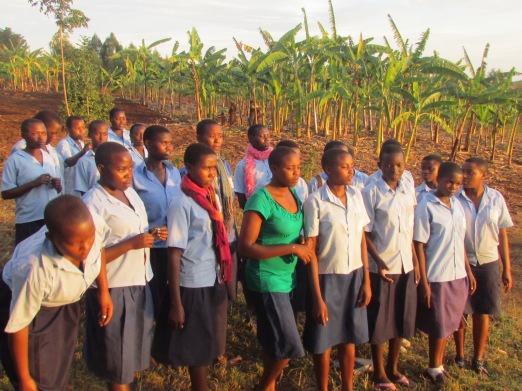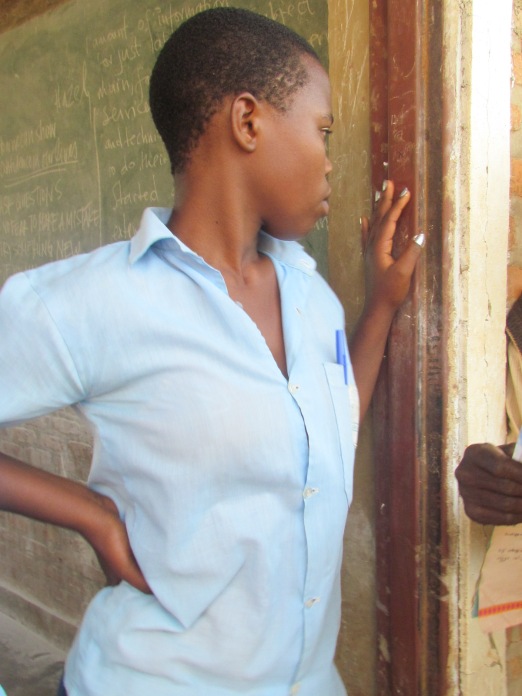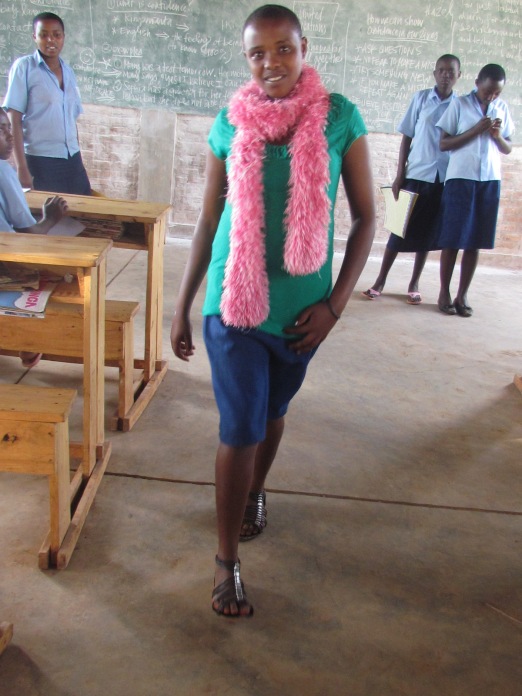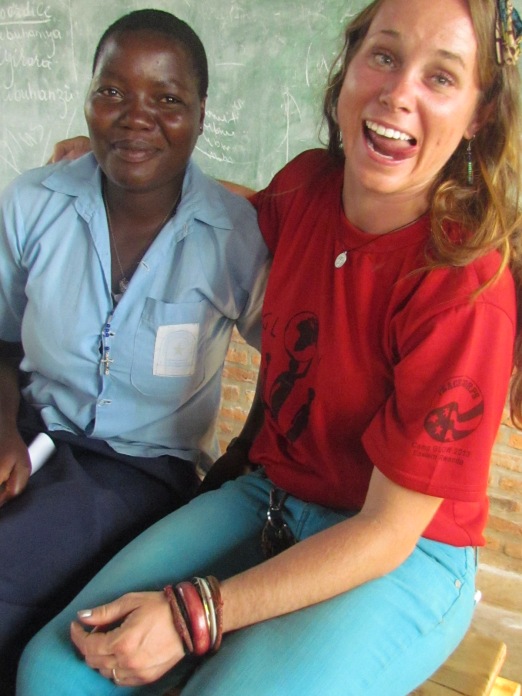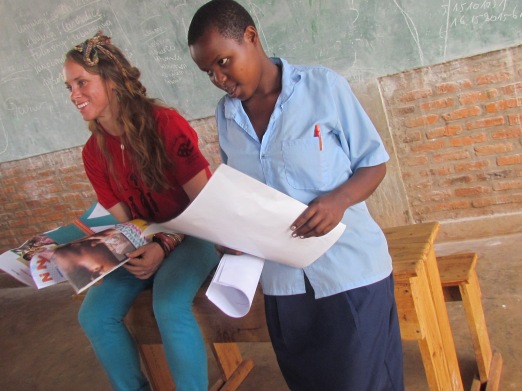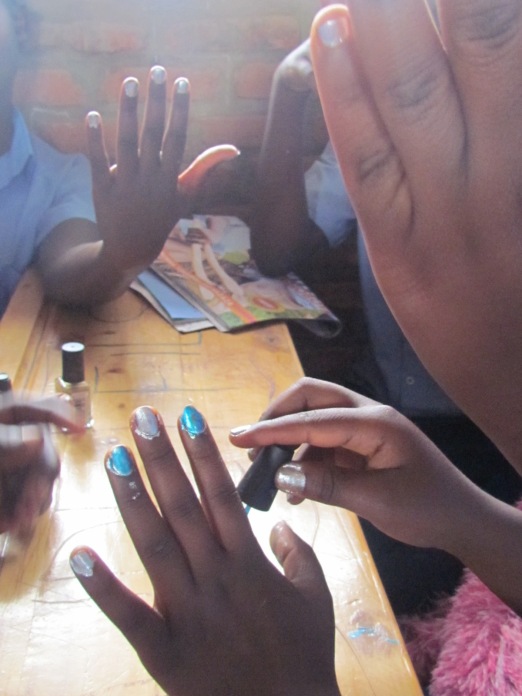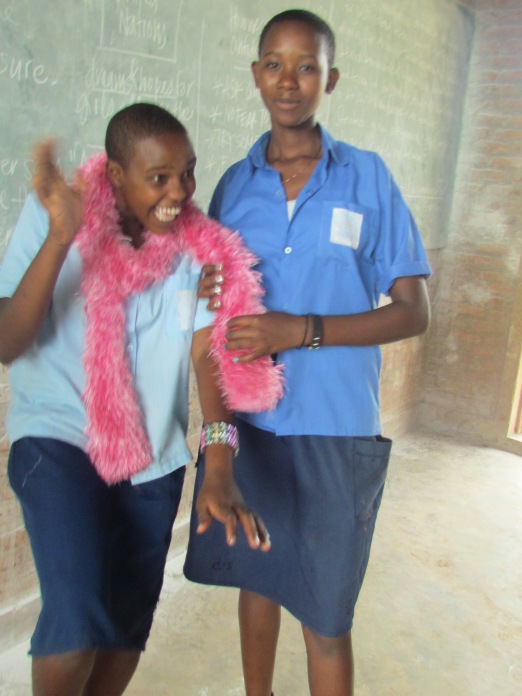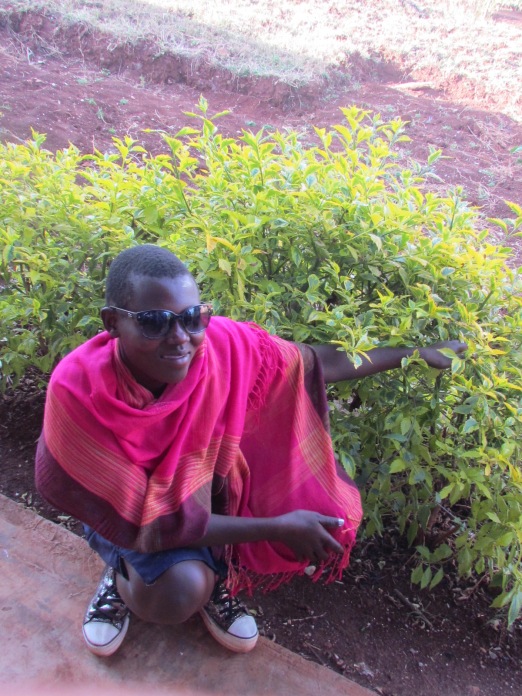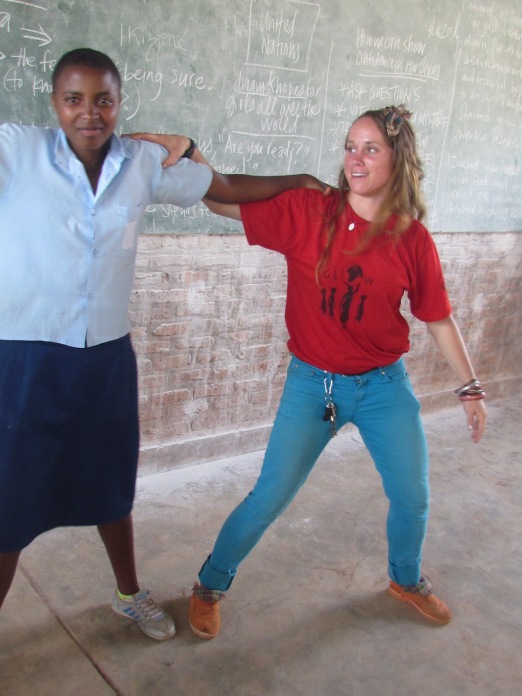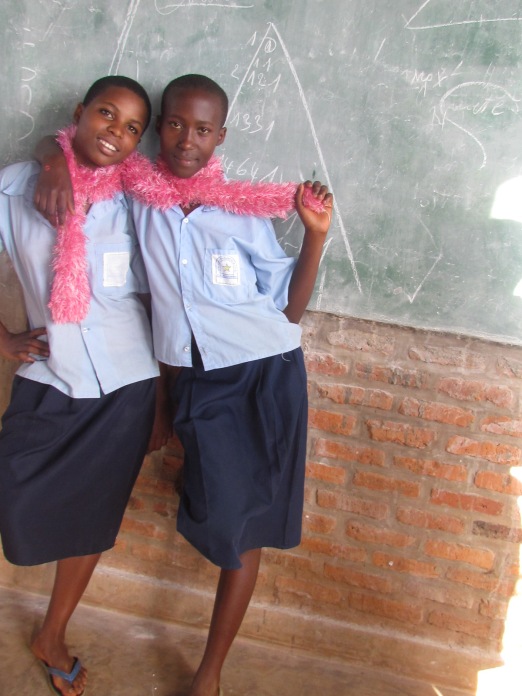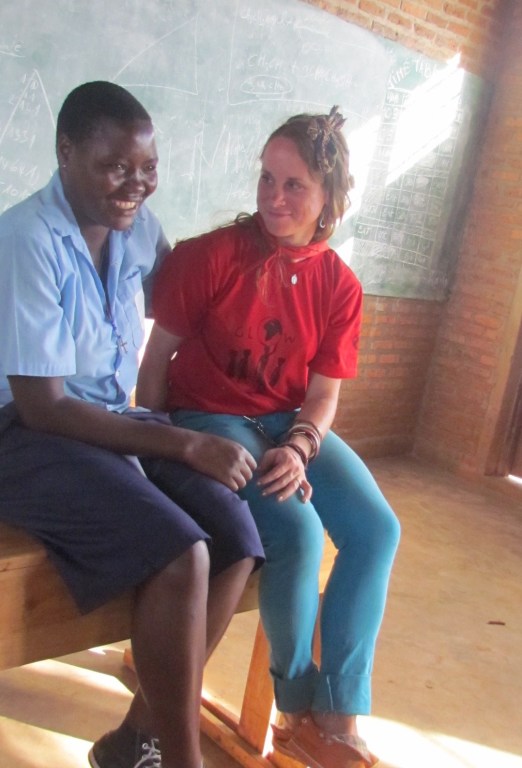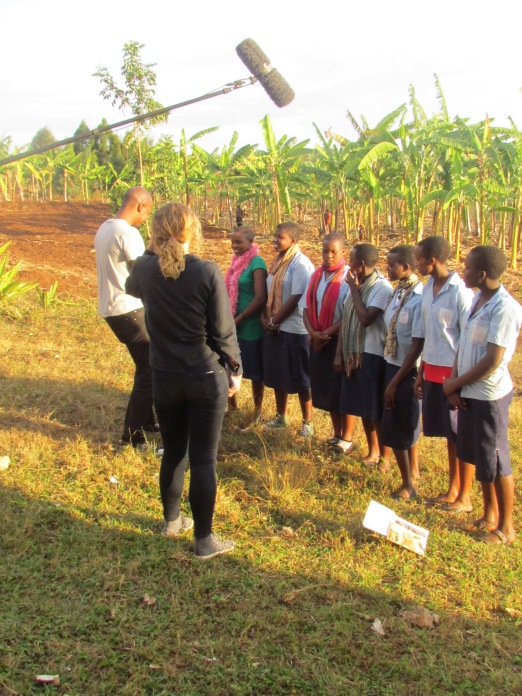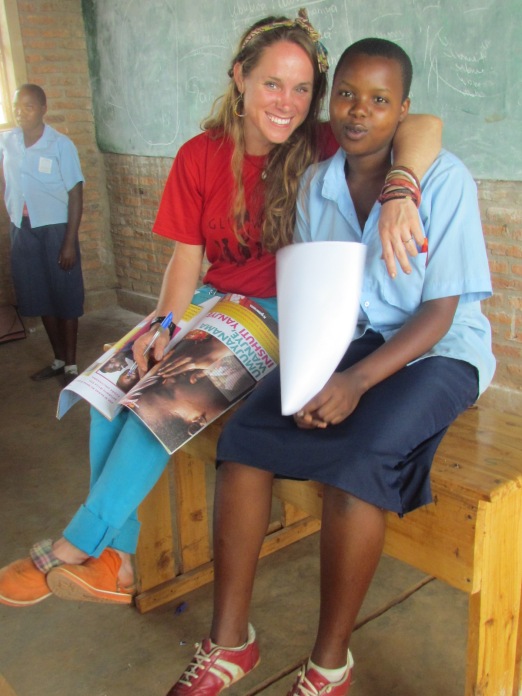My senses are consumed. The smell of death permeates the air. I feel sick. I literally feel like I’m going to throw up. My mind is racing. I don’t really know what to feel, what to think, or what to say. Yet, the guide is explaining everything and I have to translate to dad what she is saying.
I may be translating the words but I can’t really process the heavy weight that they carry:
2500 people died here.
The Interhamwe clubbed people to death, sliced them with machetes, threw children against the wall, and raped women.
People in 1994 came here, to church, to be safe. They were deceived. Many of the church leaders had a direct hand in the killings that happened here in April 1994.
Our guides’ family has its remains in the tomb to our left. Her mother, two sisters, and brother.
Families’ bones were attempted to be kept together in the mass graves. They tried. Sometimes it was difficult, as the way these people were killed left it hard to determine who was who. However, many individuals left their clothing on the pews so that survivors would recognize their identity from that particular hat, shirt, or pair of shoes.
Here, in the Bugesera District (about 30 minutes south of Kigali), 65,000 people lived here in 1994. 2,000 survived the Genocide. 2,000 only.
Each person had to carry an identity card indicating their ethnicity: Tutsi, Twa, Hutu, or Naturalist. We are told that we can hold the card, look closely, and see that the cards do in fact, identify each person by their ethnicity. I take that worn, pea green card in my hand, and I can feel the evil. As I do this, dad tells me again, the hairs on his neck are standing.
Our guide, Josiane, survived because she ran. She was able to run away from the church, find security in the woods, and wait. Meanwhile, her entire family was murdered. She is the only one that remains.
I asked her in Kinyarwanda, “isn’t it hard to work her everyday? To see the memory and remains of your family each time you step in here (in the underground area where the mass graves are kept)?”
She replied, with tears in her eyes, “yes, but it’s important to remember. It hurts a lot, but I carry them with me in my heart. We must remember.”
I look over at Dad and he’s visibly shaken. It’s unbelievable that here we are, standing beneath the beautiful statue of Mary, above so-called ‘holy ground’, and yet this is what happened here. Unbelievable, unbelievable, dad repeats over and over again. He’s touching the blood-stained clothes that fill the sanctuary, looking at the left behind rosaries that many of these victims likely prayed on, and I see that he too, feels deeply disturbed.
I’m a Christian woman. And yet, in this place thick with pain and agony, I don’t understand. I don’t understand how a refuge like this could be hijacked, how people could be so deceived, and how church leaders could turn on their people because of a sick, heavy load of propoganda, fueled by a long history of tension, the mingling of colonial powers, and resentment. Still, thousands of people were killed HERE, in a CHURCH. The international community, well, they mostly did nothing. Here, on this property, at the Nyamata Genocide Memorial Site, there is an Italian woman who is buried here. She was one of the few international community members that stood up and said something. She found out what was happening in this community and tried to gather support from abroad. She tried, but to no avail. She was killed in the years before the Genocide, because she was known to be a trouble-seeker, you could say. She is honored here, because she is remembered as an ally, a friend, an example of someone who said that this was not okay. No matter that Rwanda has few minerals to contribute to the world; Rwanda is turning on itself, people are dying, and this is Genocide. Few listened.
The Nyamata Memorial Site is an important place to visit. It’s arguably THE most intense thing that I have seen or experienced since I’ve been in Rwanda for nearly 16 months. We had visited the Kigali Memorial Site days earlier, and though it’s also deeply moving, it acts more like a museum, to inform people on what happened in Rwanda. In Nyamata, however, this is ground zero. This is where events actually took place, and so I left this memorial profoundly more impacted, and with one lingering, powerful question. WHY?
I think what leaves me most shaken is that now I have a growing and deepening relationship with Rwanda–the people, the country, and the culture. While I take the time, thoughts, and prayers to mourn the people that were killed in this church, my mind can’t help but wonder and return back to my own little village and think about what the people there must have seen, felt, and been through. I’ve been there for awhile now, and still, I don’t know most of their stories and their histories. It’s heartbreaking really, because this history is still so fresh, and most people I come into contact with, were and still are affected. Many of my students have only one parent. I’ve talked to people who were actively involved in harming other people at that time–to what degree, I don’t know, but they have told me that they did “bad things”. Dad and I had lunch with a couple of my girls and their family (one of a few families that have become my Rwandan family while living here) and it was amazing! They set out the meat, rice, peas, and the special china–just for dad and I. We laughed, talked, and dad told me he was extremely humbled by this obvious display of hospitality and happiness. It all hit home for dad when we had the following conversation (which I translated for both the grandmother and my dad):
Dad: How long have you lived in this house?
Grandmother: *thinks and hesitates for a moment* 17 years. We came here after the war ended.
Dad: How many kids do you have?
Grandmother: I had 10. Now, I have 2. 8 died.
I looked into her eyes and she seemed to be in a different place entirely. She was remembering something from long ago, with a forlorn glance in her eyes. It disappeared as quickly as it came, but my heart sank deeply as she relieved whatever she was relieving. It’s interesting to note that she referred to the Genocide period as “war”–which can sometimes indicate which side of the conflict they were on. Of course, you never want to read too much into anything when it comes to this sort of thing, but you definitely do wonder. Whether a “war” or a “genocide” to my community members, a lot of people died, a lot of people turned on each other, and it makes for the present-day communities still very difficult to sort through. I don’t know what one of my many Rwandan grandmothers has been through (believe me, I’ve been temporarily adopted by quite a few old mamas, and they all are, in perfect honesty, bad ass) but an 80-something year old mama in Rwanda, with little money and little belongings, has certainly been through a lot. She carries a lot of memories and also a lot of love. She’s a shining example of all that’s good in Rwanda, despite the unfathomable history traced within her past.
More than anything, I hope that I (and now my dad, as he has been here and seen what Rwanda has to offer) can tell people back home and the world that Rwanda is a really really good place. The Nyamata Genocide Memorial is a sobering experience; the Genocide really did happen and it was really that horrible. But, as someone who has lived here, not in Kigali, but in the village, I think I can offer a vision and a picture for how far this country has come and where it is going.
I’m trying really hard not to pretend that I know everything–because how could I? I am, in fact, NOT Rwandan (as hard as I try to be). The Nyamata Memorial helped me remember that; as integrated as I may be, I was not here for that divisive, horrific, and bloody piece of history, and so I will never ever understand. Arguably, most Rwandans will never understand it either. But I’m telling y’all, this place is amazing. I thank God that my dad came when he did, because I feel like I can see this place with a new set of eyes and a new vigor of energy. And what I’m seeing, well, it’s really really good. People in Rwanda want good things to exist in this country. Aside from their being a lot to do (gorillas, safaris, National Parks, hikes, volcanoes, cultural tours, historical sites, etc.) the people are wonderful here. They like visitors, and in my experience with my dad, they welcome them with open arms. For Christmas, we’ve found ourselves lake-side, at this beautiful, quaint, and small little hotel. They have the best customer service I have experienced in Rwanda, and they know exactly how to make people feel at home. Plus, their coffee and African tea rocks.
I guess what I’m really trying to say when it’s all said and done, is that when I went through that horrific memorial (and let me repeat, as horrible as it is, it’s 100% necessary to do), I was aghast with what happened in this country. Mostly, I think, because it doesn’t really match up with what I’ve experienced in this country, nearly 20 years later. I see remanants of maybe why things could have happened here (for example, the sometimes blinding and absolute devotion to authority figures) but overall, I see a peaceful country that is safe, completely gorgeous, and with a lot of potential. Like any country, there are a lot of issues, but I think the potential far outweighs the concerns. I hope that Rwanda will always remember what happened here. I hope they use the wounds and pain for good. I hope that people will continue to visit places like Nyamata in order to reflect, cry, pray, and remember the many many lives that were lost here so violently and unfairly. I hope that things will continue to always get better.
I remember a notorious professor at my small liberal arts college, Hendrix, asked our class once about progress. I was a little baby freshman, taking this class called Journeys which has Hendrix students explore “basic” ideas like free-thinking, civilization, and the philosophic approaches of various thinkers and shakers like Plato, Confucius, and Jane Addams. He told us early on, one day, with a condescending smile that progress was a myth, something that really can’t be achieved.
Maybe I wear rose-rimmed glasses too much, but I really think he’s wrong. Because progress doesn’t always have to be represented by more buildings, more money, more people, or more materials. It doesn’t mean, necessarily, that you have more technology or infastructure.
Progress, in my young, idealistic opinion, is about ideas. Here in Rwanda, the ideas of the people are slowly developing and changing. Steeped deeply in traditional culture, I hope that the youth of Rwanda can keep their beautiful traditions and values (family, cows, praying, fanta, God, banana beer, dancing, etc) while embracing peace, gender equality, education, and innovation. Things like this don’t happen quickly, believe me. There are plenty of my ‘mamas’ that would be abhorred to see a man in the kitchen cooking or using that extra money to send another girl to school. However, there are people that are trying to become entrepenuers, that are bringing women into leadership, and that are believing in themselves to change their country. The commonality is that most Rwandans, in my experience, never want anything like the Genocide to happen again. As long as that remains center in these ideas of progress, I think many people will be happy, surprised even, at what Rwanda can do in the world.
